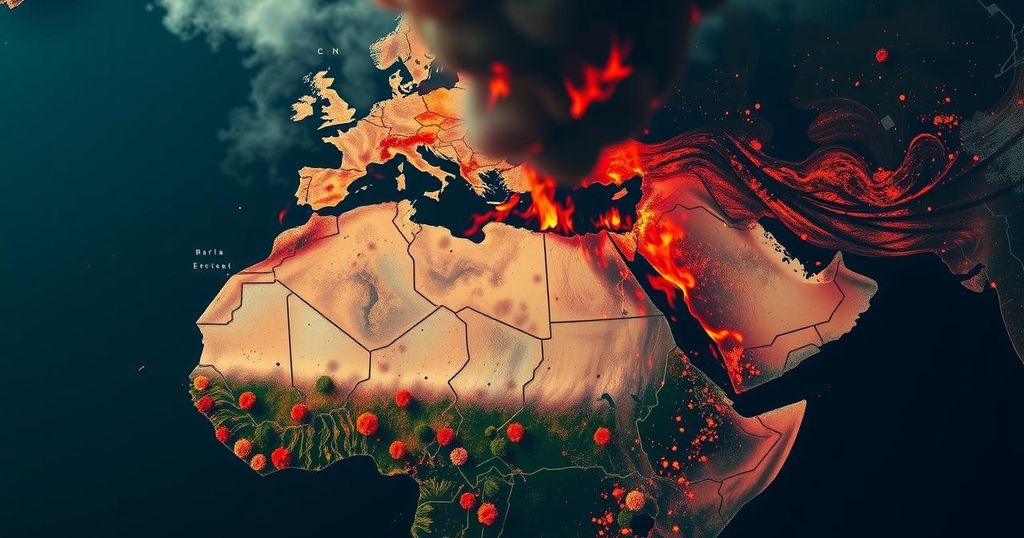As the U.S. nears another presidential election, tensions in the Horn of Africa are rising, particularly in Ethiopia, where past conflicts have left numerous issues unaddressed. Prime Minister Abiy Ahmed’s pursuit of Red Sea access is straining relations with neighbors like Somalia and Egypt while complicating geopolitical dynamics due to outside influences from Turkey and the UAE. Urgent diplomatic efforts are required to prevent further instability that could escalate humanitarian crises and impact global trade.
As the United States approaches another presidential election, concerns are rising once again regarding escalating tensions in the Horn of Africa. This is particularly significant as a previous escalation in Ethiopia coincided with the last election period in November 2020, leading to a protracted and devastating conflict centered around the Tigray region. Although a cessation of hostilities agreement was reached in 2022 that curtailed widespread violence, numerous issues remain unresolved, particularly pertaining to the displacement crisis. Moreover, the coalition navigated by Prime Minister Abiy Ahmed has since fractured, resulting in ongoing civil conflicts in the Amhara and Oromia regions. Currently, with the United States preoccupied by a tightly contested presidential race, the potential for renewed violence in this strategically important region may be overlooked. Prime Minister Abiy Ahmed’s urgent desire for access to the Red Sea has triggered alarm among neighboring countries. His recent negotiations with Somaliland over sea access have exacerbated long-standing tensions with Somalia. Concurrently, Egypt’s interest in the Grand Ethiopian Renaissance Dam continues to breed anxiety concerning Nile water allocations, prompting Egypt to bolster its collaboration with Somalia against Ethiopia, recently supplying military resources. Eritrea has also engaged in talks with Somalia and Egypt, seeking to maintain its influence in the region by preventing Ethiopian predominance. In addition to regional players, external powers with vested interests in the Red Sea and Gulf of Aden have intensified their involvement. Turkey has reinforced ties with Somalia, while the United Arab Emirates retains its support for Abiy Ahmed’s administration. This intricate web of historical grievances and international interests elevates the risk of miscalculations that could spiral into violent confrontations, ultimately costing lives and imperiling global trade via critical shipping routes. Moreover, any instability is likely to exacerbate refugee flows, further challenging the resources of host nations, thereby impacting the international community as a whole. The necessity to avert further conflict is urgent. The ongoing civil war in Sudan, characterized as one of the most dire humanitarian crises globally, requires immediate international attention and support amidst escalating famine. Al-Shabaab’s persistent presence in Somalia highlights a fragile state that may pose broader security threats as it may align more closely with Yemen’s Houthi militants. Given the domestic political challenges present within the United States, it is imperative that American officials prioritize diplomatic measures aimed at de-escalating tensions within the Horn of Africa, mitigate proxy confrontations, and avert impending disaster.
The Horn of Africa has been a region of significant geopolitical interest due to its complex web of ethnicities, historical rivalries, and resource competition. The civil war in Ethiopia, particularly centered around the Tigray region, marked a critical juncture not only for Ethiopia’s stability but for the entire region. The cessation of violence in 2022 ended the immediate bloodshed but left many key issues unaddressed. The aftereffects include an unstable coalition government in Ethiopia and simmering conflicts in adjacent regions such as Amhara and Oromia, which further add to the fragile political dynamics. Additionally, the interplay of outside powers and their interests in the Red Sea and Gulf of Aden creates a precarious situation that could lead to further conflict if not properly managed.
In summary, heightened tensions in the Horn of Africa, particularly surrounding Ethiopia, pose a significant risk to regional and global stability. With multiple internal conflicts brewing and external influences complicating the landscape, urgent diplomatic engagement is necessary to avert further crises. As domestic politics in the United States intensify, attention must be directed toward fostering peace and addressing humanitarian challenges in the region. The implications for both African lives and the global economy make it imperative for American leaders to prioritize these issues and work toward meaningful resolutions.
Original Source: www.cfr.org







